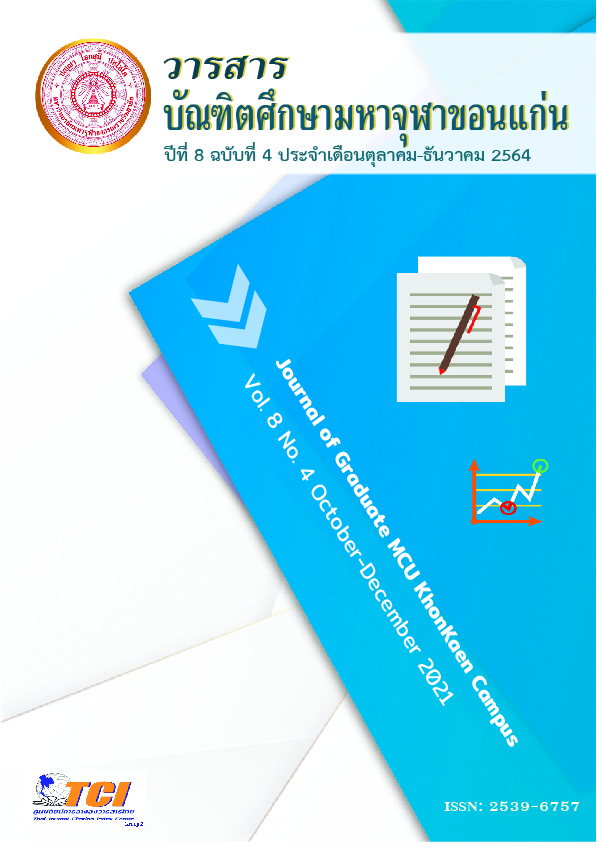THE HUMAN RIGHT IN THERAVADA BUDDHIST PHILOSOPHY
Main Article Content
Abstract
The objectives of this research paper are: (1) Studying the concepts of human
rights (2) Studying the meaning and importance of human rights (3) Analyzing the human
rights evident in the view of Theravada Buddhist Philosophy. Human rights refers to the
right of human dignity. Which is inherent to human beings from birth, including the rights,
liberties and equality of persons recognized or protected by law. Which is guaranteed
with worldwide recognition in which the fundamental rights all human beings must equal
in order to be able to live in peace is dignity, freedom, goodwill and compassion for one
another. Regardless of any difference in race, color, sex, age, language, religion, physical
status or health. Principles related to human rights, it was found that Principles in Theravada
Buddhism and Human Rights Principles All have demonstrated the equal value of humanity.
And emphasize the right and freedom by pointing out that humans have the potential
to do things on their own, they should be kind to one another, forgiving one another.
Through actions that are harmonized between the body, speech and mind, such as the
Benchmark Principle, the Principle of Faith, the Principle of Karma, the 3 main benefit is
personal benefit. Benefit others and common interests
Article Details

This work is licensed under a Creative Commons Attribution-NonCommercial-NoDerivatives 4.0 International License.
References
กรมคุ้มครองสิทธิและเสรีภาพกระทรวงยุติธรรม. (2551). แผนสิทธิมนุษยชนแห่งชาติ, ฉบับที่ 2. กรุงเทพมหานคร: ศูนย์บริการ วิชาการแห่งจุฬาลงกรณ์มหาวิทยาลัย.
กุมพล พลวัน. (2547). สิทธิมนุษยชนในสังคมโลก. กรุงเทพมหานคร: นิติธรรม. สำนักพิมพ์พิลักษณ์.
เกษฎา ผาทอง. (2559). ยุทธศาสตร์การพัฒนาประชาธิปไตยและกระบานการประชาสังคมไทย. บัณฑิตวิทยาลัย: มหาวิทยาลัยจุฬาลงกรณราชวิทยาลัย.
ณฤณีย์ ศรีสุข. (2563). หลักสิทธิมนุษยชนที่ปรากฏในหลักธรรมทางพระพุทธศาสนาเถรวาท. วารสารวิทยาลัยสงฆ์นครลำปาง, 9(1), 114-127.
ดิเรก ควรสมาคม. (2560). กฎหมายมหาชนแนวประยุกต์. (พิมพ์ครั้งที่ 4). กรุงเทพมหานคร: สำนักพิมพ์วิญญูชน.
ธนรัตน์ ทั่งทอง. (2554). สิทธิมนุษยชนในกระบวนการยุติธรรม (ป.วิ.อ.). กรุงเทพมหานคร: เนติบัณฑิตยสภาในพระบรมราชูปถัมภ์.
ธีรพล อรุณะกสิกร. พระราชบัญญัติคณะกรรมการสิทธิมนุษยชนแห่งชาติ. กรุงเทพมหานคร: สำนักพิมพ์วิญญูชน.
บรรเจิด สิงคะเนติ. (2547). สิทธิเสรีภาพและศักดิ์ศรีความเป็นมนุษย์ตามรัฐธรรมนูญ. (พิมพ์ครั้งที่ 2). กรุงเทพมหานคร: สำนักพิมพ์วิญญูชน.
บุญแทน มะลิอ่อง. (2554). หลักธรรมในพุทธศาสนาเถรวาทกับการส่งเสริมสิทธิมนุษยชน.
พระครูปทุมกันทรา (บุญแทน มะลิอ่อง). (2545). หลักธรรมในพุทธศาสนาเถรวาทกับการส่งเสริมสิทธิมนุษยชน. บัณฑิตวิทยาลัย: มหาจุฬาลงกรณราชวิทยาลัย.
พระธรรมปิฎก (ป.อ.ปยุตฺโต). (2536). พุทธวิธีแก้ปัญหาเพื่อศตวรรษที่ 21. กรุงเทพมหานคร: โรงพิมพ์มหาจุฬาลงณราชวิทยาลัย.
พระวิทยา ญาณสาโร (คุ้มราษฎร์). (2554). การศึกษาแนวคิดเศรษฐกิจพอเพียงในคัมภีร์ พระพุทธศาสนาเถรวาท. ใน วิทยานิพนธ์พุทธศาสตรมหาบัณฑิต. บัณฑิตวิทยาลัย: มหาวิทยาลัยมหาจุฬาลงกรณราชวิทยาลัย.
พิทยา ว่องกุล. (2542). สร้างสังคมใหญ่ : ชุมชนชนาธิป-ธรรมาธิปไตย. กรุงเทพมหานคร: โครงการวิถีทรรศน์.
พีระศักดิ์ พอจิต. (2555). สิทธิมนุษยชนในหลายมิติ. กรุงเทพมหานคร: สำนักงานสิทธิมนุษยชนแห่งชาติ.
สถิระ ราชรินทร์. (2562). แนวคิดภราดรภาพในพุทธปรัชญาเถรวาท. วารสารมหาจุฬาวิชาการ, 6(ฉบับพิเศษ), 153-165.
สมชาย กษิติประดิษฐ์. (2546). สิทธิมนุษยชน. (พิมพ์ครั้งที่ 4). กรุงเทพมหานคร: สำนักพิมพ์มหาวิทยาลัยรามคำแหง.
สุเชาวน์ พลอยชุม. (2537). จริยศาสตร์แนวพุทธ. (พิมพ์ครั้งที่ 3). กรุงเทพมหานคร: โรงพิมพ์มหามกุฎราชวิทยาลัย.
เสน่ห์ จามริก. (2545). พุทธศาสนากับสิทธิมนุษยชน. กรุงเทพมหานคร: สำนักงานคณะกรรมการสิทธิมนุษยชนแห่งชาติ.
อุดมศักดิ์ สนิทพงษ์. (2550). สิทธิมนุษยชน. กรุงเทพมหานคร: สำนักพิมพ์วิญญูชนจำกัด.

